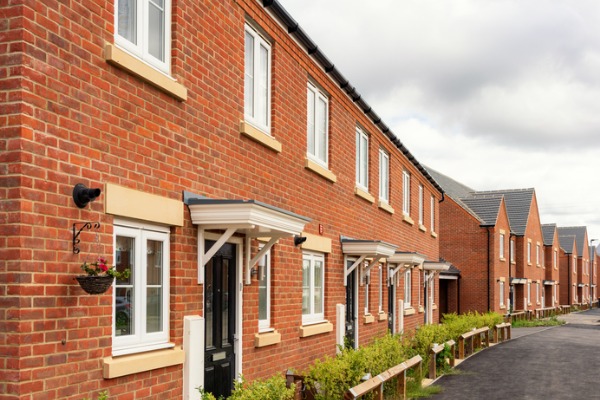Barratt Developments cuts dividend as annual profits fall
Times are tough for housebuilders, with any number of headwinds making life difficult, but this company is playing a decent hand, argues our head of markets. It's taking sensible measures to navigate turbulence and the shares still yield almost 8%.
6th September 2023 08:24
by Richard Hunter from interactive investor

All things considered, Barratt Developments (LSE:BDEV) is playing a decent hand with the woeful cards being dealt to them in the current environment.
The list of headwinds is well-documented and lengthy and is likely to spill over into the new financial year. Squeezed mortgage affordability and availability is resulting in waning customer demand, while broader concerns over general economic growth, consumer confidence and spending are all darkening the picture.
At the same time, the removal of the Help to Buy scheme has removed an important plank from first-time buyers, and legacy costs for remedial building work continue to come at a significant cost, totalling some £179 million in this period.
- Learn more: SIPP Portfolio Ideas | How SIPPs Work | Transfer a SIPP
The spectre of inflation is an additional burden, with house price inflation failing to keep up with build cost inflation, which has been running between 9% and 10% over the year. There are, however, some signs of improvement on this front as some of these pressures show signs of easing, and Barratts is predicting a figure of nearer 5% over the coming year.
The uncertain outlook is reflected in the shareholder return announcement, traditionally a sign of management confidence. There will be no further share buybacks over the coming period, while the dividend has also been reduced as the group intends to retain its cash to buffer against the upcoming challenges. A final dividend per share of 23.5p is down 8.6% from 25.7p in 2022. Despite the dividend reduction, the projected yield of 7.6% remains punchy given the economic backdrop and will continue to catch the eye of income-seeking investors.
Indeed, net cash of £1.1 billion leaves Barratts in a healthy position to weather any immediate storms. The group has stepped back from investment in new land, opting for a “highly selective” approach. At the same time, a continued focus on cost control, the targeted use of incentives and new sales to the private rental and social housing sectors, are all likely to become dominant themes in the shorter term.
Against this backdrop, and with a share price valuation which is running low by historical standards, the group has delivered a relatively robust performance. Revenue for the year increased by 1% to £5.3 billion, in line with expectations, while the adjusted pre-tax profit number of £884 million provided a small beat to the expected £880 million, even though the number was 16.2% lower than the previous period.
The reduction in activity and slight shift in the business mix, coupled with inflationary pressures, weighed down on both adjusted operating margin, which declined from 20% to 16.2% and return on capital employed, which fell to 22.2% from a previous 30%. Completions were also down by 3.9% over the period to 17,206, with the group guiding a range of between 13,250 and 14,250 for the current year.
Net private reservations also fell over the year, and have continued to decline in the last few weeks despite the traditional seasonal bounce. More positively, a forward order book of £2.4 billion is already 49% forward sold for the year, providing some visibility of earnings.
- The Week Ahead: Barratt Developments, Currys, WH Smith
- ii view: income play Taylor Wimpey offers confident outlook
- ii view: housebuilder Barratt Developments takes corrective action
The cut to the dividend is inevitably disappointing but a prudent move in a tightening environment. While there has been havoc in the sector, resulting for example in the imminent relegation of peer Persimmon (LSE:PSN) from the FTSE 100 index, Barratts has managed to hold up well in relative terms.
Over the last year, the share price has risen by 8.5%, as compared to a gain of 2% for the wider FTSE100. On closer inspection, however, the 38% fall in the share price over the last two years provides some perspective as to the damage which the economic situation has wrought.
The housebuilding sector is currently one which requires a longer-term view, especially in light of a prevailing housing demand and supply imbalance. The market consensus of its shares as a 'buy' reflects confidence in Barratts’ ability to emerge from the storm in relative good health.
These articles are provided for information purposes only. Occasionally, an opinion about whether to buy or sell a specific investment may be provided by third parties. The content is not intended to be a personal recommendation to buy or sell any financial instrument or product, or to adopt any investment strategy as it is not provided based on an assessment of your investing knowledge and experience, your financial situation or your investment objectives. The value of your investments, and the income derived from them, may go down as well as up. You may not get back all the money that you invest. The investments referred to in this article may not be suitable for all investors, and if in doubt, an investor should seek advice from a qualified investment adviser.
Full performance can be found on the company or index summary page on the interactive investor website. Simply click on the company's or index name highlighted in the article.